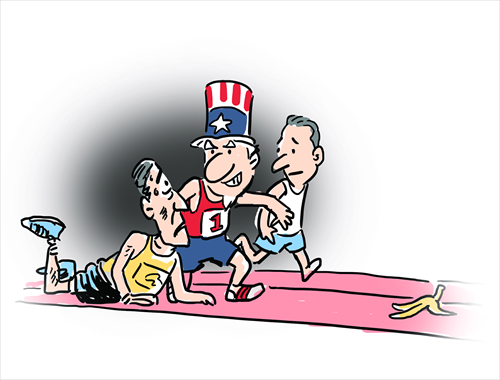US under Obama reluctant to stop making messes all over the world

Illustration: Liu Rui/GT
US President Barack Obama has been in office for more than five years, but his diplomatic practice has so far ended with misery.
The Iraq War that lasted for seven years and five months brought about radical anti-government forces that have relations with Al Qaeda and have seized northern provinces. It also brought about a more pro-Iran government.
The 13-year-long Afghan War led to a US that has to engage in negotiations with the Taliban and an Afghanistan hostile to the US.
Bashar al-Assad, whom the US has been trying to defame in every possible way, was reelected as Syrian president. The Arab Spring brought about an anti-US wave across the Middle East.
While isolating Russia due to the Ukrainian crisis, the US also finds Russia and Europe are getting closer.
While unscrupulously supporting Japan led by right-wing forces, its "pivot to Asia" strategy has become a tool to vitalize Japan's militarism. The US' "mess-making" image is hard to change.
Such an eye-watering diplomatic sheet reflects the decline of US power and the rigidness of its strategic mentality. The two time-consuming and costly wars and the financial crisis that swept the whole world have corroded the strength of the US, which corresponds to the conclusion of Paul Kennedy in his book The Rise and Fall of the Great Powers that military overstretching leads to the decline of empires.
Meanwhile, the increasingly severe partisan struggles in US domestic politics serve as a negative democratic model.
The US' torture of prisoners overseas and the PRISM-gate scandal have weakened Washington's soft power. It is time for the US to reflect upon its failed global diplomacy and reform its political and economic systems.
Against the backdrop that the security of all countries are interrelated, the US still insists on alliances. In the past two decades, NATO has expanded three times and strengthened the military alliance as the US advocated the "Russia threat," which has led to the split of European security.
When Asian countries progressed into regional integration, the US advocated the "China threat" to strengthen the Asian alliance system, with the US-Japan alliance at the core, which will surely lead to the split of Asian security.
The old mentality of "alliance" has not only worsened the international environment in which the US' own domestic economic plight is to be solved, but also brought about criticism of other countries.
The US has been obstinate in pursuing its dream of hegemony. It not only excludes others in the traditional security field, but also tries to define the boundaries in new security areas, such as information warfare and cyber space.
Experts from US think tanks who remain cool-headed have reminded those in power that the driving force of the US diplomacy is a revitalized economy. The urgent task is to solve domestic problems, rather than fan up the flames of troubles around the world.
When Obama first took office in 2009, the US public expected him to take their country out of the economic downturn like former president Franklin Roosevelt did before. Five years have passed, the economy hasn't got rid of sluggishness, political extremism remains, and the gap between different social classes has widened.
The tragedy of the US diplomacy is that decision-makers habitually refuse reflection.
Last month, when Obama delivered a speech at the US Military Academy at West Point, he articulated his vision of the US' leading role in the world for the century to come.
But if the declining US that brought about numerous tragedies to the world still wants to dominate the world, the world will come to the edge of a cliff. It seems just too difficult for the US to learn to be a normal country.
The author is a professor at the Institute of International Relations of China Foreign Affairs University. opinion@globaltimes.com.cn